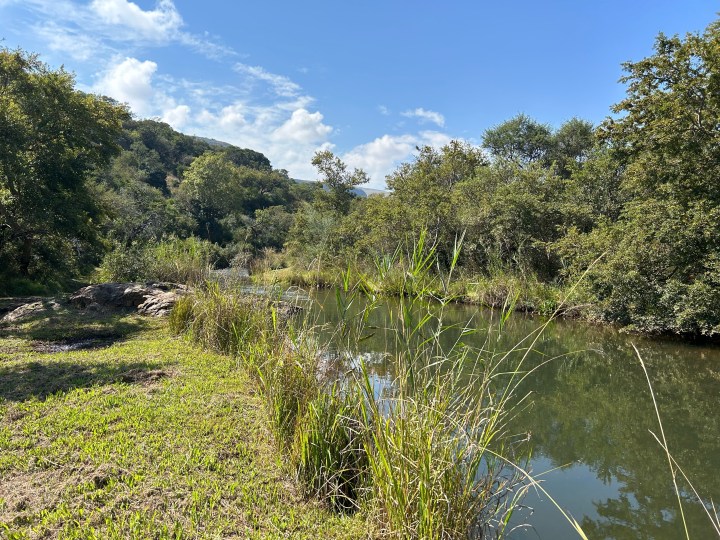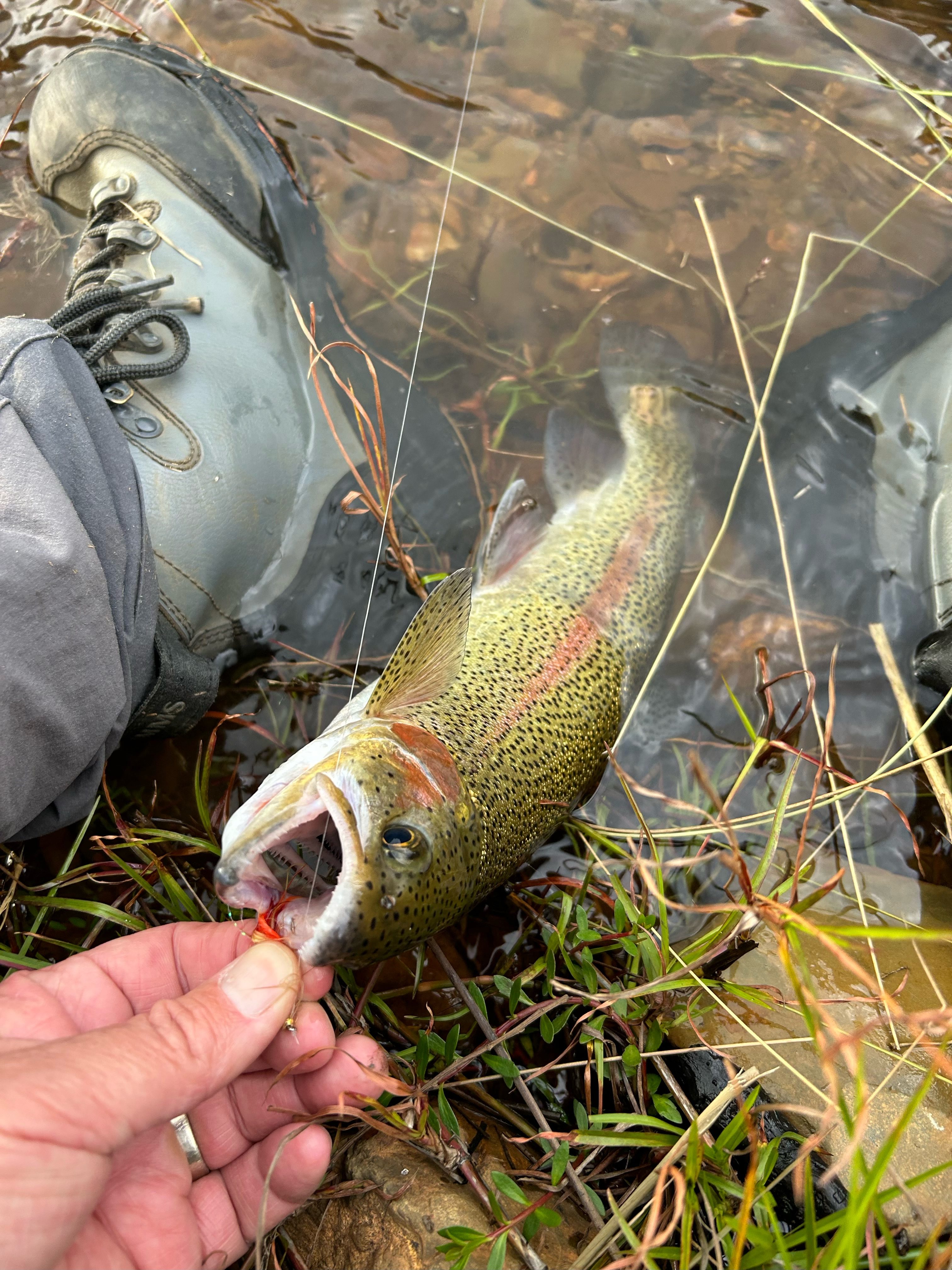FLY FISHING OP-ED
A weekend of trout fishing in leopard country is a reminder that SA still has clean waters

South Africa has an emerging water crisis that partly stems from climate change, and partly from state failure. So it’s always a treat to fly-fish for trout in clean waters, which is cleansing for both the mind and the soul.
Trout are what biologists call an indicator species. If they can thrive in a wild river system or human-made dams, it’s an indication that the aquatic ecosystem is doing just fine.
There is a school of thought that trout as an alien species have no business in South Africa’s waters, and government policy on this front remains typically muddled. This author does not plan to wade far into this debate, beyond throwing a cast or two that will likely give rise to a few objections.
As previously noted, in a developing economy like South Africa’s with its many challenges, the objections to trout look out of place. The industry spawned around trout has contributed about R1.8-billion annually to South Africa’s gross domestic product (GDP) and sustained the employment of about 13,000 people in 2014, according to an analysis that year by Cobus Venter, an economic consultant.
The fact is that in some of South Africa’s river systems, trout – mostly rainbow but also browns – are well established and have been for more than a century. Their presence in such waters is a gin-clear indication that those systems are clean, and that the wider ecosystem is likely to be relatively healthy as well.
The same cannot be said for many of South Africa’s water systems, which are in a shambolic state.
Untreated sewage is a disgraceful problem in many South African metros, which also face shortages of purified water that flow from the failure of government departments to do their job right as bottom feeders scavenge the funds required for maintenance and development.
The stream that runs through the Cradle of Humankind has been fouled by the collapse of the Mogale City’s sewer treatment plant, devastating the native wildlife including fish as well as small businesses in the area.
That was also an area where I fished for trout regularly in stocked dams, and I miss that convenience as a Johannesburg resident.
So it was a relief to finally cast for trout on a recent April weekend at Rivendell, which is 17km from Lydenburg in countryside that is teeming with leopard and other wildlife.
It was my second journey there on a trip hosted by Frontier Fly Fishing, a Sandton-based shop. Co-owner Tom Lewin was our host, and he brought along legendary guide Mark Yelland to help out.
It is, quite simply, a special place. Coming from Johannesburg via Dullstroom, you drive through Lydenburg and then hit the R36 for a few kilometres before hanging a right for a few more kilometres down a dirt road.
And presto, you are in paradise.
The Spekboom River cuts through a Bushveld valley alive with game and birds. There are reportedly no less than 15 families of leopard in the vicinity, and anglers are always told in no uncertain terms to be off the water by dusk.
The fishing is superb as the river is regularly stocked while also boasting wild populations of trout that have established themselves – another indicator of the health of the waters.
I caught no fish bigger than about 400 grams and only caught a few in total – others in our party who are far better at the craft of fly fishing had the podium totals – but just casting in clean waters is cleansing for the mind and the soul of an angler.
I will readily admit that most of my fish I caught stripping a streamer through the waters, which is anathema to purists such as my host Tom, who is a self-confessed dry fly snob.
A dry fly floats on the water, often with a nymph pattern tied beneath that sinks below. This is very technical fishing that requires the fly to float in a natural way that produces no “drag” on the water, which makes it look unnatural and therefore unappetising. A streamer by contrast is a “wet fly” that goes below the surface that is stripped through the water by a pulling motion with your free hand.

A rainbow landed by the author at Rivdendell Trout Estate near Lydenburg. (Photo: Ed Stoddard)
In his classic A River Runs Through It, Norman Maclean relates how his father, a Presbyterian minister and avid fly fisherman, told him and his brother “… about Christ’’s disciples being fishermen, and we were left to assume… that all first-class fishermen on the Sea of Galilee were fly fishermen and that John, the favourite, was a dry-fly fisherman.”
As an atheist, this angler makes no claims to be a disciple, and certainly not one of John’s stature in the eyes of Norman Maclean’s father – though at least still first class compared with bait and lure anglers. But I did take a fish on a dry fly and a couple on a nymph presented below one to partly gain some measure of redemption in Tom’s discerning eyes.
One of the joys was simply to be on clean and unpolluted water in a stunning setting, with various species of birds including kingfishers flitting about while baboons chattered in the bush and you walked over the tell-tale spoor of kudu and other buck on the paths. And as dusk fell, you beat a hasty retreat to your lodge because you could be in the menacing view of a big tom leopard.
I’m not aware of any attacks there in recent years, but you just don’t take that chance with dangerous African wildlife.
The shocking state of the road on the way up from Johannesburg between Dullstroom and Lydenburg is frankly a far bigger hazard, and serves as further withering testimony to the unfolding failure of the state which has befouled so much of South Africa’s precious waterways and crippled the reliable supply of H2O to much of the population.
But it’s nice to know that rivers such as the Spekboom still run through a relatively pristine landscape, and one in a region that has much farming and mining, as well as the expanding urban sprawl of a town like Lydenburg.
Where there is trout there is hope for South Africa’s waters – and the pure unadulterated joy of a tight line. DM





Thanks for the meander, Ed. As an enthusiastic, if not very successful, fly fisherman, I can relate to your tales above. It’s been some time, but in my experience the road between Waterval Boven and Lydenburg is even worse than the one between Dullstroom and Lydenburg. Having moved to the Western Cape three years ago, I really appreciate the quality of the roads, but I do miss the trout. Stywe lyne!
There’s some great fly fishing for trout in the Western Cape too Pieter. Check out the Cape Piscatorial Society who control access to some wonderful rivers.
Thanks. Much appreciated.
Yes, the Blaauwbank is in a terrible state and the hyacinth is moving closer to the confluence with the Crocodile.
Great story Ed. As for the leopards, I really doubt that one would attack you in the dusk, these wonderful beasts steer well clear of humans. Lions are a different matter altogether.
Well written, safe and entertaining….thanks Ed
So how much cleaner – not to mention more biodiverse – would those waters not be if our trout-snobs would only fly for our good indigenous yellowfish?